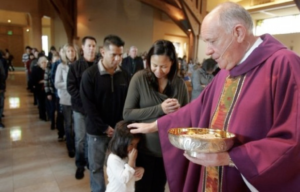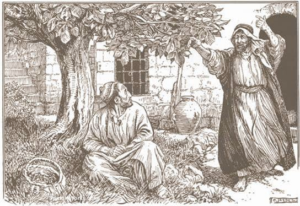Co-missioners,
This is Part II of what seems to be evolving into a three-part series by our editor on the tumult of January 6. We pray you find it of use.
Peace and Joy,
The Crossings Community
A Sermon in the Wake of the Capitol Riot
by Jerome Burce

Preface
“Yes, there is Gospel sufficient to our terrible American day. The challenge is to dig it up. To name it. To thank God for it with joyful hearts even as the groans continue…”
That’s how I ended last week’s initial reflection on the sack of the Capitol on January 6. Then I turned to the pressing challenge of digging up and delivering a dose of Gospel sufficient to the screaming needs of the people I’d be talking on Sunday. Today I pass along a transcript of what I said when the day arrived.
I expect that some or even many who read this will find it weak and disappointing. So too for those who listened on Sunday. I told them as much, as you’ll see.
The problem is our sinners’ addiction to the Law as the tool for resolving the issues we have which each other. I had to confront this addiction in myself as the thoughts churned last week. What do I do when I know that you’re wrong? I tell you so. The more clearly I know this, the louder I say it; and when your error threatens us both, I add urgency to the volume. Am I not responsible before God and humankind for doing so? If I fail to scream that the match you’re striking in the tool shed will set the gas can on fire, am I not culpable when the shed blows up, killing you and me both?
And isn’t this an apt metaphor for the peril our country is facing? Against all reason and evidence, a Big Lie gets told: “The election was stolen.” Worse, the lie gets widely believed, notwithstanding the sober administration, oversight, and adjudication of the election by countless down-to-earth poll-workers, officials, and judges. “These are the results,” they say. Drawn as they are from both of the two parties that have stood in such bitter toe-to-toe contention these past many years, some say it grimly, others with glee. Still, say it they do, and with as much unanimity as we’ve seen in our country for a very long while. “This person won. That person lost.”
“Not so,” says that other person, a man whose proclivity for self-aggrandizing falsehood has been on incessant and manifest display since the day he blithely brushed aside the photographic evidence about the number of people who showed up for his inauguration. What gives here? Does he take us all for fools, not least his own devoted supporters? Does it matter in the least to him that his claim in this case insults the aforementioned election workers and officials of his own party who dearly wanted him to win but found themselves bound by the numbers and their sense of integrity? Does he care that pushing this claim threatens the civil order, to say nothing of the country’s constitutional fabric? Seems not.
Comes the astonishment. People continue to swallow what the man says. They do it in great numbers even after the horror of January 6. Christian people do this too, as David Brooks reported in a singularly dismaying New York Times column a few days ago. Pause at this point to take a look at it. Brooks writes about the rage directed at certain hard-right evangelical pastors who finally broke ranks with Mr. Trump on the day after the riot. Brooks also offers his analysis of the rage, and a prescription for dealing with it. Suffice it to say as Lutherans will that he hopes in the Law.
I toyed with the Law too last week. Challenged by some thoughtful, grieving members of my parish council to craft a response to the events of January 6, I drafted a formal resolution—as legal a format as formats can be, come to think of it. Looking back at it with today’s fresh eyes, I notice that its content was markedly “of the Law” as well. For example, “Whereas we share a common, unflinching commitment to the rule of law as God’s good gift for the care and protection of this sinful world….” And from that as essential predicate there flowed the following as two of five resolutions: “…that we recognize and name the widespread claim of a stolen election for the lie that it is” and again, “that we deplore the efforts mounted on January 6 to halt the certification of duly reported election results, whether by lawless citizens mounting an assault on the halls of Congress or by politicians asserting what they knew to be false.”
All perfectly reasonable, as I said to myself while drafting these, and if anything, understated; the very least that any God-respecting group of people should be able to say and ought to say. Self-respecting people too. What’s wrong with us if we can’t say it? If we’re that diffident, how do we hold up our heads in public, let alone before the God who looks for a modicum of truth and basic honesty in all of us?
Then I presented this draft to the council. Heads nodded. Spirits sank. I could see this in faces and hear it in voices. “Yes, Pastor, what you write here is correct. But there are people in our congregation who will take offense at it. It will make them angry. They’ll want to leave.”
I bridled. I protested. I stewed overnight. Today I’m thanking God for saints with a better sense of “church” than their pastor sometimes shows.
Saints like these can call a pastor to repentance—or jolt him awake. That’s what happened, as I think back on it.
All this is by way of background to what came from the pulpit on Sunday. See below. I share it with a certain amount of fear and trembling. It seems on the one hand like violating the privacy of a family conversation. But then, say I, it’s out there in the public anyway via livestream broadcast and a subsequent recording. If it goes further, so be it.
For an audience like this one, the sermon also calls for some commentary on the preaching moment, on the operations of Law and Gospel, and especially on the scandal of the latter, which is both real and enduring. See my comment early on about expecting many who read this to find it weak and insufficient—appallingly so, perhaps. But these things I leave for next week. What I’m dumping on you today is already twice as long as one wants it to be. Thank you for your patience in wading through it—and yes, I welcome comments.
JB
Fairview Park, Ohio
+ + +
The Sermon
- Pre-texts: the lessons for the Second Sunday after the Epiphany, Revised Common Lectionary Year B.
- The text in fact: Romans 1:7b, as in the frequent opening line of a Lutheran preacher’s sermon.
+ + +
Grace to you and peace from God our Father and from our Lord and Savior Jesus Christ.
And having said that, let me pause before I go any further to make sure that all of us heard it.
Grace and peace—think about that. The two things our battered, scared, and angry country needs more than anything else this morning.
Grace and peace to you. Not one or two or even some of you, but to each and every one of you without exception; to all of you together.
Grace and peace to you from the God who looks on you this very morning as his sons, his daughters, each of you dear and precious to him beyond understanding, and certainly beyond your own capacity to value and treasure each other.
And finally, grace and peace to you from Jesus Christ our Savior and Lord. That’s Lord as in Commander in Chief, to use today’s kind of language. It’s also Lord in the older sense of the one who owns you. He bought you with a price, as we heard St. Paul say. And not, as Luther explains in his catechism, with a gold-or-silver price, but with his holy, precious blood and his innocent suffering and death—and why? So that you might be his own, and not somebody else’s. Least of all the devil’s slave. And not the slave of all the sin, the suspicion and fear, the hatred and contempt that the devil is drowning our country in right now—the world too, for that matter.
Grace and peace—our Lord specializes in these two gifts above all others. Just now we heard how he found a fellow named Philip and asked him to follow him. I trust it reminded us of how he found each of us through that gracious, peace-giving gift of Holy Baptism that most of us didn’t ask for, and how in finding us, he told us to follow him too. And yes, we’ve all been doing that. We wouldn’t be here right now, we wouldn’t be tuned in from home, if we weren’t following him. So with that, a quick reminder to all of us, myself included. To follow Jesus means to struggle and sweat to make grace and peace our specialty as well. It’s our specialty as Christian people because it’s the specialty of Christ our Commander in Chief, the one we’re loyal to above all others.
 I pray and trust that all of us at Messiah, in this congregation of Christian people, simply take this for granted. Or if not, our Lord is here every Sunday without fail to drive the point home, simply gushing with grace and peace the way he always does. In the Old Testament reading just now we heard how, in Samuel’s day, the “word of the Lord was rare, and visions—glimpses of God at work in the world—were not widespread.” But that was then. This is now—the new now that Jesus died to create and was raised to establish as the new norm for people who trust him. These days a vision of God at his gracious and peace-making best is simply a matter of opening your eyes to the marvels right in front of you. You’ve heard me say this many times before: pay attention when we get to Holy Communion. If you’re stuck at home, stick around for once to watch what happens when we get to that part of the service. Notice how everybody gets to come up here, no questions asked; how everybody hears the same words as they receive the host in their hands. The body of Christ given for you, and given no matter what you said or thought or did last week. No matter what sins you bring to this morning’s table. No matter what judgments you’re under from the people you disagree with, to say nothing of God. And all this takes place not because some soft-hearted, muddle-headed preacher made it up. It happens instead because your pastors are operating at the express command of Christ, their Lord and yours.
I pray and trust that all of us at Messiah, in this congregation of Christian people, simply take this for granted. Or if not, our Lord is here every Sunday without fail to drive the point home, simply gushing with grace and peace the way he always does. In the Old Testament reading just now we heard how, in Samuel’s day, the “word of the Lord was rare, and visions—glimpses of God at work in the world—were not widespread.” But that was then. This is now—the new now that Jesus died to create and was raised to establish as the new norm for people who trust him. These days a vision of God at his gracious and peace-making best is simply a matter of opening your eyes to the marvels right in front of you. You’ve heard me say this many times before: pay attention when we get to Holy Communion. If you’re stuck at home, stick around for once to watch what happens when we get to that part of the service. Notice how everybody gets to come up here, no questions asked; how everybody hears the same words as they receive the host in their hands. The body of Christ given for you, and given no matter what you said or thought or did last week. No matter what sins you bring to this morning’s table. No matter what judgments you’re under from the people you disagree with, to say nothing of God. And all this takes place not because some soft-hearted, muddle-headed preacher made it up. It happens instead because your pastors are operating at the express command of Christ, their Lord and yours.
Give them my grace, he tells us. Show them my peace. And then he says it again to all of us. Follow me. Love each other as I have loved you. As for your neighbors, love them at least as much as you dare to love yourselves.
+ + +
Now I for one can’t think of a tougher job to be saddled with this week, and I suspect the same is true for many others of you. “Thanks for nothing, Jesus,” as we so want to groan, wretched ingrates that we also are.
Here’s the truth of it: grace and peace are in terribly short supply in our country this morning. I can’t detect the faintest whiff of either of them in our public conversation. As for our private thoughts, let’s not even bother going there.
Those pictures we saw from Washington D.C. a week ago Wednesday are still burned in our minds. I want to take it for granted that they horrified us all, without exception. They made us angry too. We couldn’t help but blame somebody. The question is, who do you blame—aside, that is, from the hooligans who smashed windows and attacked police officers and dared to desecrate our nation’s sacred spaces, a few of them with murder on their minds, apparently? But why did they do this? Who do you hold accountable for the appalling fact that anybody would ever think to do this in the first place?
And with that I bite my tongue. I do that on the fairly certain guess that some of you, a few of you, at least—all dear—are hoping against hope that I’ll go no further. You’re afraid what I would say next is not what you would say next, and then we’d have a problem, wouldn’t we. Our own little version of the same ugly, terrible problem that’s been ripping our country apart these past many years.
But then in biting my tongue for your sake, I’m grieving others of you who wonder what’s wrong with this pastor of ours that he’s so spineless; that he should cringe from calling the thing what the thing is when the moment screams for honesty—honesty as you see it, that is; honesty as you can’t help but see it—the truth so plain, so completely beyond argument that you can’t imagine how anybody would think to argue with it. But argue they do. Argue we all do as we speak our blunt truths about who’s really at fault for what happened last week. Flip through the news channels later today. Poke around in Facebook for a bit. See how well we’re doing in persuading others to face the truth—to admit the truth, the sharp particular truth, that each of us sees so very plainly from whatever side of the great divide we happen to be shouting from.
We all need God to save our country today. No one else can. We sure can’t do it ourselves. The question that weighs on me this morning—and I say this not all lightly—is whether God is of a mind to save America. Americans? Yes. But America the country? Why should he be? It’s not as if we the people have doing a bang-up job of earning his grace and favor. See, for example, how well we’ve been doing with caring for each other in the middle of a pandemic. Over 4,000 deaths in America yesterday. As someone pointed out to me, that’s like 10 jumbo jets, each packed with 400 passengers, all falling from the sky on the same day. Imagine the horror. But it happened every single day last week. And still we deal with careless unthinking behavior in each other as we go about our days.
So here’s the obvious question. If we can’t knuckle down to save each other, why should God stop in?
+ + +
So back we go to the astonishment we started with. God has stepped in. God stepped in for you, for me, this very morning with those impossible words we heard ten minutes ago. Grace to you, and peace.
God stepped in with the power of the Holy Spirit to help us hear those words, to believe those words, to anchor our hearts and hopes once again in the Lord and Savior whose death turned those words into the truest words that any of us will ever hear.
God steps in this morning to help this little bunch of people believe these words together, and to act on them together. He’s doing this with other groups of people scattered all around the world today, bumbling, stumbling people like us who come together in Jesus’ name to hear the truth of who he is and what he has done, and after that to celebrate this truth; to act on this truth; to live in this truth.
 I mean the truth we heard Nathanael blurt out in the reading just now. “Rabbi, you are so much more than a rabbi. You are the Son of God. You are the King of Israel.” And we, of course, will want to push that even further—we who know a lot more than Nathanael did at that point of what this Jesus would do, and who he would do it for. So what we say is, “You are the King not just of Israel but of every land, of every nation. You are the Lord—our Lord; our Commander-in-Chief, the one we listen to and are loyal to above all others. You’re the One we take our lead from.”
I mean the truth we heard Nathanael blurt out in the reading just now. “Rabbi, you are so much more than a rabbi. You are the Son of God. You are the King of Israel.” And we, of course, will want to push that even further—we who know a lot more than Nathanael did at that point of what this Jesus would do, and who he would do it for. So what we say is, “You are the King not just of Israel but of every land, of every nation. You are the Lord—our Lord; our Commander-in-Chief, the one we listen to and are loyal to above all others. You’re the One we take our lead from.”
“So do it,” Jesus says. “Follow me,” he says.
And with that he leads us into the strangest way of winning and ruling that anyone has ever seen. The world has never understood it, as St. John reminded us on Christmas morning. And to this day the world still doesn’t get it. America doesn’t get it. That includes some citizens of America who think this country either is or ought to be Christian country, and to that end a handful of them joined the mob on January 6 and carried crosses to the Capitol steps. Grace and peace to them this morning. They badly need it. And much as it may grate on others of us, what they need is what they’ll get. Why? Because that’s who Jesus is.
This Lord of ours, the one we follow, doesn’t win by crushing his enemies, or by abusing those who mock and hate him. He wins by laying his own life down for those enemies. [When we were still sinners, that’s when Christ died for us.] That’s what his cross is all about.
And now when he commands us to follow him, he expects us to do the same. “Take up your cross,” he says. “Get ready to hurt. Get ready to lose and be a loser for someone else’s sake. And start this losing with the people that no else in their right minds would want to be caught dead with. Yes, the poor. The destitute. The immigrant, legal or illegal—all of these, yes, and more; but also the people screaming at you, despising you, offending you. These days the people saying crazy ugly things on Facebook or whatever. The white supremacist. The raging stuck-up liberal. Those are the ones I send you not to beat and conquer, Jesus says, but to lose for, the way I lost for you. And how do you lose? By loving somebody who, as you and all other right-thinking people see it, doesn’t deserve to be loved. These days that includes a lot of somebodies you just can’t stand, people whose views and choices and opinions simply appall you.
“Follow my lead,” Jesus says. Love each other as I love you all. Love your neighbor however badly it may hurt to do that.”
And with that he sends us into another week knowing full well that all of us are going to let him down again. We always do. We always will. And still this Lord of ours sticks with us.
And that, you see, is why this Lord of ours is the only Lord worth sticking with in turn. There is no other like him. And much as I know that I for one will let him down this week, I pray with all my heart that I will do a better job of following him than I did the week before.
I pray this for us all—and for everyone in this land of ours who dares to wear his name.
The peace of God that surpasses all understanding keep your hearts and minds in Christ Jesus.




You must be logged in to post a comment.